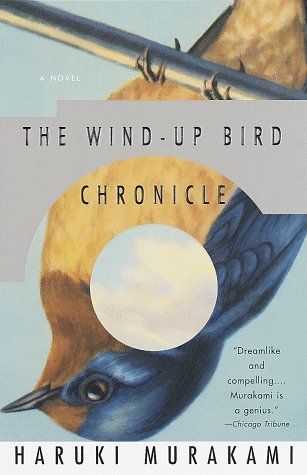Review: Haruki Murakami’s “The Wind-Up Bird Chronicle”
by Miles Raymer
Anyone who reads Murakami expects a hefty dose of weirdness, but I think The Wind-Up Bird Chronicle set a new bar for me. This novel’s psychological density and elusive tone make it difficult to say anything definitive about it, except perhaps that it subverts the idea that human experience is definable in any consistent way. I don’t think describing the plot, conflicts, and characters would communicate what this book about, nor would it provide readers with a useful sense of whether or not it would be a good fit for them. Instead, I’ll try to describe Wind-Up Bird more generally, especially in terms of its considerable ability to affect my emotions.
At the risk of sounding obnoxiously vague, I have to say that The Wind-Up Bird Chronicle is more of a feeling than a story, more of a state of mind than a coherent narrative. Murakami’s first person narration is both hypnotically placid and shockingly perceptive. Whether he’s describing moments of intense emotion or ones as mundane as food preparation, just being inside Murakami’s head is an understated pleasure. Rather than following a traditional storyline, Wind-Up Bird is a platform for surreal musings about repression and expression, the trauma of war and violence, and the nature of fate and free will. Murakami approaches these themes in a way that feels universally human but also unmistakeably Japanese.
Something that impressed me repeatedly while working my way through Wind-Up Bird was Murakami’s fearless talent for constructing self-contained universes that don’t adhere to consistent rules of conduct or physical laws. Murakami seems to suggest that we have to take the world exactly as we find it, and not be overly concerned with why things are the way they are, but rather with figuring out what little power we can exert given our embeddedness in a strange and fluctuating world. We might encounter reality in an entirely different way from those around us, and yet we can’t escape our involvement with or dependence on other humans. I’m not sure this perspective would be a good one to assume in my own life, but it sure makes for great literature.
I suppose the downside of Murakami’s genius from my point of view is that it’s so radically insular. I sometimes have trouble connecting with his work on an empathic level. Even as I found my emotions highly receptive and malleable in the hands of this bizarre tale, I also felt a deep, constant distance between myself and the characters. This chasm is perhaps nothing more than the space that divides all people from one another, the one we placate in our quotidian struggles, ignore when the lights are low, and forget only in momentary dissolutions of self. I think it takes a mind like Murakami’s to gaze into that void and fill it with something startling and wildly creative.
I don’t understand this book or the mind that made it. But I feel a transient closeness to it, like I’ve sat next to it on a train, or passed it on the street, or seen it for a moment in my lover’s eye. It’s like an old friend I’m just meeting for the first time, or a tune from childhood long forgotten. More than anything else, though, The Wind-Up Bird Chronicle feels like a made up moment frozen in time, one made heavy with the weight of its own mystery.
Rating: 8/10
